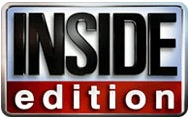The Impact of the COVID-19 Pandemic – at Work and at Home
How did COVID-19 affect my professional and my personal life? Dr. Ted Eisenberg wrote about his experience in the Sept. issue of the Journal of the POMA.
On Tuesday, March 17, as I was seeing prospective cosmetic breast surgery patients in my Philadelphia office, I got a call from Nazareth Hospital: Starting immediately, all elective cosmetic breast surgeries 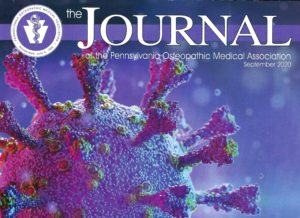 were suspended. The restart date was unknown. The hospital wanted to maintain capacity and supplies for the anticipated increase in COVID-19 patients. This meant I had to notify all of the women who were scheduled for surgery for the following day and in the coming weeks. In addition, I cancelled all office consultations that were already on my calendar.
were suspended. The restart date was unknown. The hospital wanted to maintain capacity and supplies for the anticipated increase in COVID-19 patients. This meant I had to notify all of the women who were scheduled for surgery for the following day and in the coming weeks. In addition, I cancelled all office consultations that were already on my calendar.
My hope was that the work stoppage would be temporary, and I decided not to cut back on employee hours. My employees are my front line, and I did not want them to incur any additional hardship.
With the help of my wife, Joyce, I applied for a Paycheck Protection Program loan from the SBA. It was a detailed application, and my wife was a tremendous help. I was approved for a loan on the second round, and it was a huge relief to have money for salaries, rent and utilities. I will be relying on my wife again to complete the loan forgiveness application.
Some of my employees had health concerns that outweighed their coming in to work; others were comfortable coming into the patientless office to answer phones and organize for the eventual reopening.
To accommodate my post-op breast augmentation and breast lift patients, who I routinely see at one-week, three-weeks and three-months, I offered them telemedicine. Everyone was quite pleased with that option: Many of my patients come from a distance, and they appreciated not having to make the drive. Many also have young children, who were home from school, and this made their lives easier. This was my introduction to virtual care, and I found it to be as effective as an in-person visit. I’ll continue to offer this option to patients in the future. I believe it’s a boost in the right direction for customer service.
For a week or two, I went into the office for the telemedicine calls, to consult with my staff, and to pick up my mail. When all my post-op patients had been seen, my quarantine began.
Over the next 10 weeks (before Nazareth Hospital reopened for elective surgery) my health was heightened physically and emotionally. Some nights I slept up to eight hours, easily a quarter more than on previous nights when I had to get up by 5 a.m. for a day in the operating room.
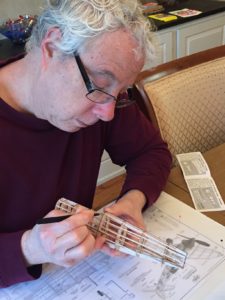
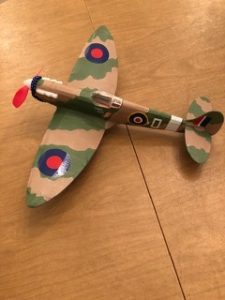 I exercised every day on my home treadmill, instead of a couple times a week, which was all I could fit in when I was working full time. I had a lot of fun building a balsa wood model airplane, which I had last done when I was 13. (Who has time for that?!) My plastic surgery skills came in handy: I found I had way more dexterity, focus and patience than I did when I was a teen!
I exercised every day on my home treadmill, instead of a couple times a week, which was all I could fit in when I was working full time. I had a lot of fun building a balsa wood model airplane, which I had last done when I was 13. (Who has time for that?!) My plastic surgery skills came in handy: I found I had way more dexterity, focus and patience than I did when I was a teen!
I read hundreds of backlogged articles in plastic surgery journals online, whittling my emails down to 0, and started back at work on a scientific paper. Most of all, I had a great deal of time with Joyce, my soulmate, best friend and wife of 47 years. For me, being housebound with her was like heaven on earth.
I came to appreciate FaceTime and Zoom. What a relief to see my daughter’s face when she recovered enough strength post-Covid to FaceTime with me. I had been quite worried when she texted her “final wishes” and expressions of love and appreciation to family and friends for fear she would not recover. Since we weren’t able to come in contact during her illness and for weeks after, this was the best we could do to get “close.” Fortunately, she has been completely better for months now, and hugs are back on the agenda.
Via Zoom, I participated in two virtual shiva minyans. This is the Jewish tradition of family and friends gathering after a funeral to honor and memoralize a loved one. The hugs were virtual, and I missed the in-person experience, but I felt like the sharing of memories was enriched because I was able to hear the words of everyone present on the video conference – and they could hear my reminiscences. Although it was different, it was still warm and loving.
During this time, Nazareth Hospital conducted weekly conference calls for physicians on staff, led by Michael Magro, DO, president, and Edward O’Dell, DO, vice president. The conversations about COVID and what was happening in the hospital and the community were frank, informative and extremely reassuring.
I’ve worked at Nazareth Hospital exclusively since 2001, and I’ve been very happy there. I’ve liked operating in the safety of the hospital with the general staff, sensitive and competent nurses and certified anesthesiologists and nurse anesthetists. And toward the end of May, when the state loosened restrictions on elective surgery and the hospital announced its thoughtful and thorough reopening plans, I was confident that my patients and I would be safe there as well.
In mid-May, in anticipation of the OR reopening, I resumed office hours. I didn’t know if women would be comfortable coming into the office when we reopened or what the level of interest would be for breast implants and breast lifts during the pandemic. I only had hope. Much to my surprise and delight, there was a huge pent-up demand for these services.
We established protocols to protect ourselves and the patients. We devised a questionnaire to screen patients when they called for an appointment. Patients were told to wear a mask. No children were allowed; if necessary, women could only bring a person they had quarantined with (if that person was also asymptomatic). On arrival, patients were checked with a non-contact thermometer and a pulse oximeter. Cosmetic breast surgery consultations were scheduled one hour apart so there wouldn’t be more than one patient in the office at a time.
We wore disposable gowns, masks and gloves and changed them between patients. We cleaned all hard and soft surfaces between patients as well and installed special air purifiers in strategic locations in the office. When possible, we maintained the recommended 6-foot social distance.
To break the ice in consultation (How odd that the patient and I couldn’t see each other’s face!) I pointed to an 8-1/2 x 11 color picture of George Clooney in his scrubs from his days on the TV show ER. I told my patients that this was how I looked under my mask – in case they were wondering! I 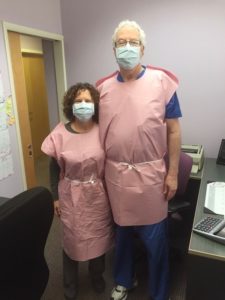 explained that my hair was white now because my dark dye had worn off during the pandemic. The women could relate. One patient said, “You look a lot like George Clooney.” “I get that a lot,” I replied. Another woman said, “The people who think that should get their eyes checked!” That was a savage burn.
explained that my hair was white now because my dark dye had worn off during the pandemic. The women could relate. One patient said, “You look a lot like George Clooney.” “I get that a lot,” I replied. Another woman said, “The people who think that should get their eyes checked!” That was a savage burn.
With the office bustling, I needed more help, and my wife agreed to work with me in the office a few days a week. Joyce has done my marketing and social media since I started practice, but it was new for her “to be in the room where it happened”!
Joyce told me that she was moved by my sensitivity and compassion with patients, and she enjoyed seeing a different side of me than she sees when we are in social situations. I would often share about my work day when I came home, but it felt good to me that she was witnessing me in action. It deepened our already significant respect and admiration for each other.
When the hospital set a start date for elective surgeries, I had high intention of getting my patients onto the operating room schedule. My staff worked hard to accommodate the new OR requirements and paperwork, including COVID-testing 48 hours before surgery (in addition to the routine preadmission testing). The first group were surgeries that were urgent (for example patients with implant deflations); the second group were patients whose scheduled surgeries were cancelled when the OR closed, and lastly new elective cosmetic surgeries.
While I enjoyed my downtime during the quarantine, I also missed work. It confirmed what I knew: that I loved my career as a plastic surgeon and wanted to continue working and making a difference in this way for as long as possible.
One of my brother’s philosophies (Ron, PCOM ’64) around the simplification of life was his belief that what largely matters is that you are happy where you head to in the morning and where you return to at night.
I’m one happy, and lucky, guy.


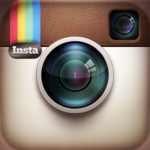
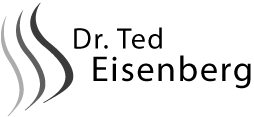
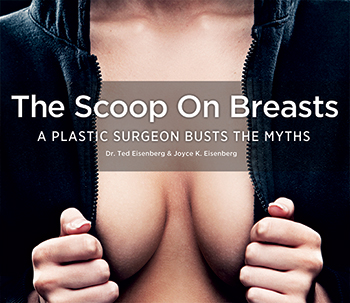 CLICK HERE TO BUY
CLICK HERE TO BUY





